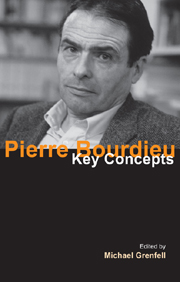Book contents
- Frontmatter
- Contents
- Contributors
- Acknowledgements
- Introduction
- PART I BIOGRAPHY, THEORY AND PRACTICE
- PART II FIELD THEORY: BEYOND SUBJECTIVITY AND OBJECTIVITY
- PART III FIELD MECHANISMS
- PART IV FIELD CONDITIONS
- 9 Interest
- 10 Conatus
- 11 Suffering
- 12 Reflexivity
- Conclusion
- Postscript: methodological principles
- Chronology
- Bibliography
- Index
10 - Conatus
from PART IV - FIELD CONDITIONS
- Frontmatter
- Contents
- Contributors
- Acknowledgements
- Introduction
- PART I BIOGRAPHY, THEORY AND PRACTICE
- PART II FIELD THEORY: BEYOND SUBJECTIVITY AND OBJECTIVITY
- PART III FIELD MECHANISMS
- PART IV FIELD CONDITIONS
- 9 Interest
- 10 Conatus
- 11 Suffering
- 12 Reflexivity
- Conclusion
- Postscript: methodological principles
- Chronology
- Bibliography
- Index
Summary
Although conatus appears infrequently in Bourdieu's corpus, it is of a piece with his theorizing more generally. The concept raises to philosophical self-consciousness a taken-for-granted attitude evinced in ordinary social research. Indeed, conatus is an arcane term even to most of today's philosophers, unless they happen to specialize in the history of physics up to the seventeenth century or metaphysics in the seventeenth century and afterward. It is also true that in most cases where Bourdieu invokes or alludes to conatus in his empirical work, the Latin term can be safely replaced by “life trajectory” without much loss of meaning. But, conatus is also meant to hold a mirror up to the researcher's own practice at least as much as to the object of research.
Conatus is the past participle of the Latin verb, conari, “to try (to do something)”. It literally means “having tried,” without any implication of success. In the original English translations of the seventeenth-century continental rationalists Descartes, Spinoza and Leibniz, conatus was rendered as “endeavour”, the term preferred by their great English contemporary and intellectual fellow traveller Thomas Hobbes in his writings. While it was during this period that conatus received its most sustained analytic treatment, the concept had already been in use for two millennia, from the time of the Stoics, to refer indifferently to the inertial motion of physical bodies and life's general tendency towards self-preservation.
- Type
- Chapter
- Information
- Pierre BourdieuKey Concepts, pp. 171 - 182Publisher: Acumen PublishingPrint publication year: 2008
- 2
- Cited by

